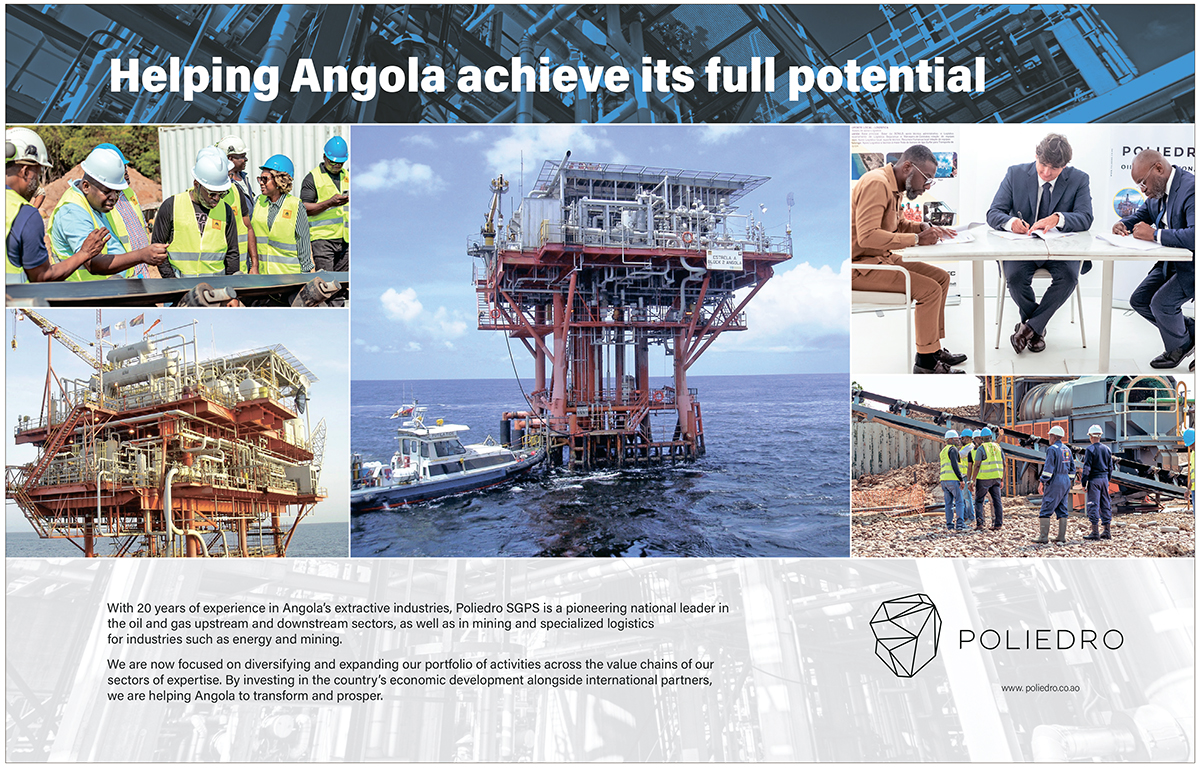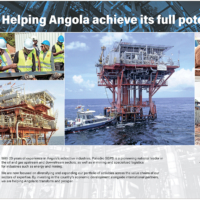For decades, Angola’s thriving oil and gas industry has been the main driver of the nation’s economy and a prominent target for foreign investors. The National Oil, Gas and Biofuels Agency, which regulates the sector, forecasts that more than $60 billion in new investments will be injected into the sector by 2030, thanks to the imminent launch of large-scale production sites and a licensing round for up to 10 additional exploration blocks.
In recent years, the country has also worked hard to diversify into other industries.

“Angola has made significant strides, but there remains a need for further development across various sectors. As a result, the country presents numerous opportunities for foreign direct investment,” said Ulanga Gaspar Martins, chairman and CEO of Poliedro Oil Corp., a leading domestic player in hydrocarbons, mining and logistics.
However, he cautions, new investors face challenges, such as trying to navigate Angola’s complex exchange rate and land policies. “To facilitate investments, collaborative efforts between the state and investment partners are imperative,” Martins said. “The importance of international investors having a local investor as a partner is underscored by the need to understand the nuances of our economy and to share risks. While not obligatory, foreign investors often prefer this approach, realizing the advantages it brings.”
Collaborating with a local expert can be a mutually beneficial experience.
“Partnerships are crucial for Poliedro, as we need more internal capacity to independently execute projects across the three sectors we operate in. While our ambition is substantial, we are realistic about our current capabilities and recognize the need for external support,” he said. “Our collaborative partnership model emphasizes shared responsibilities, excellence, risk sharing and complementarity. We apply this philosophy across all our sectors, welcoming the latest trends and aligning ourselves with industry leaders.”
An increasingly multifaceted company
Poliedro was founded in 2004 as an upstream oil company, after that industry was opened to national investors. It secured an interest in Angola’s offshore oil block 2/05 and currently holds a 12.5% share in this field, which it is developing. In 2016, the corporation ventured into the mining sector with the purchase of a diamond mine in Malanje, a province in the north of the country. Since then, Poliedro has expanded its focus to include logistics.
“Our 10-year strategic plan to 2030 aims to position Poliedro as a significant player in oil, mining and logistics. That plan is summed up by our motto: transform and prosper. While the majority of our revenues will continue to originate from extractive sectors, we intend to apply those resources to the real economy, specifically excelling in logistics to contribute to broader Angolan economic development,” Martins explained.
In line with this plan, the company recently underwent a rebranding process that introduced a subtle change to its logo. He explained: “We opted for a geometric figure, symbolizing our multifaceted approach. Currently active in three pivotal sectors of Angola’s economy, our logo philosophy reflects the diverse angles of action that define our operations.”
Poliedro has also evolved into a holding company with four subsidiaries. “In the oil sector, we have established Poliedro Energy. Our plan involves expanding in this area, with a specialization in mature oil field participation or operation. The goal is to become an operator by 2030, but we acknowledge the necessity of strategic partnerships to achieve this sooner,” Martins said. “In addition, we are broadening our focus to encompass the wider energy spectrum. We are emphasizing the entire value chain, not just oil production.”
Another of the company’s subsidiaries is Poliedro Mining, which is currently engaged in a diamond project and is now looking to diversify its portfolio by exploring the potential in strategic minerals for the agricultural sector, with the aim of lessening the country’s reliance on international markets for supplies such as fertilizers.
“The agricultural sector has emerged as a central focus for our economy, which demands sustained investments in technology and expertise to reduce dependence on imports and enhance food security. Resolving immediate economic challenges hinges on this diversification effort,” he said. “Addressing Angola’s food insecurity, we recognize the need to identify ores in the mining sector that can lower agricultural costs through local production and utilization. We see numerous advantages in fostering complementary partnerships as they align with our logic and philosophy for sustainable growth in mining.”
The third subsidiary is Poliedro Logistics. The company has operated a retail gas station in Angola for some years and intends to create a larger network. However, its overall ambitions in this industry are much more expansive.
“We spotted a gap in integrated logistics services for various sectors in Angola, especially the demanding oil and mining industries. Therefore, the company aims to organize and equip itself to facilitate movement from production centers to consumption and transformation centers,” Martins said.
In 2023, Poliedro took a substantial step in this direction when it acquired a 40% stake in the French company Sonasurf, which is part of the Bourbon group, a worldwide leader in maritime and subsea services for the hydrocarbon industry. Sonasurf is a crucial operator in Angolan maritime logistics, particularly in relation to transporting people and equipment to the growing number of offshore oil platforms in the country’s waters.
According to Martins, “Having achieved this objective, Poliedro remains vigilant for new opportunities in logistics that align with its vision for sustainable and profitable business ventures.” Potential ventures it is considering include bunkering, distributing and storing refined oil products for both national and regional customers, and providing logistics services that cater to Angola’s expanding agricultural sector. “There are burgeoning opportunities in this area, with exporting Angolan avocados being just one example,” he said.
The company’s final offshoot is Poliedro International. This subsidiary provides innovative financial solutions sourced from global markets that facilitate the company’s acquisitions and project developments, as well as offering similar personalized services to external clients.
Fostering exceptional talent
Poliedro has transformed its management philosophy over the past decade to overcome problems with monitoring and advancing its core investments in the oil industry. Some key executives had insufficient experience of working in that sector and its staff lacked advanced technical skills.
“In 2018, founding shareholders who were still involved in management relinquished control to professionals unaffiliated with the company. Our management team now comprises primarily young Angolan professionals who are tasked with implementing our strategic plan. This change empowered Poliedro to manage its assets more efficiently, facilitating project identification, structuring and execution, which is exemplified by our recent acquisition of Sonasurf,” Martins said. “Furthermore, the 2012 world oil sector crisis proved instrumental in freeing up talent in Angola, enabling us to engage individuals with a fresh mindset and a willingness to embrace new challenges.”
Poliedro continues to attract top talent and invests significantly in training. “We now have an exceptional team that is dedicated to making impactful strides. Our focus is on the ongoing development of our human capital in order to effectively navigate future challenges and global trends. Without a competent team with up-to-date knowledge, the company would be at a disadvantage given the demanding nature of our activities,” he said.
The executive believes that international oil companies currently operating in mature Angolan fields that fall below their own productivity standards could take advantage of the skills and experience that Poliedro and some other domestic businesses have accumulated.
“Despite the emphasis on energy transition, oil will remain a fundamental part of the energy mix for the foreseeable future. Transitioning oil fields to national companies is logical as fields evolve and move from a developmental to a maintenance phase,” Martins said. “This strategic move will empower the domestic business community to reinvest more robustly in the national economy. Although it presents a distinct challenge, it is well within the capabilities of national companies and, with the right partnerships, there are limitless possibilities for success.”
https://info.japantimes.co.jp/international-reports/pdf/20250428-GI-Angola.pdf
https://global-insight.net







